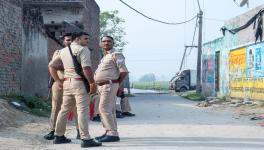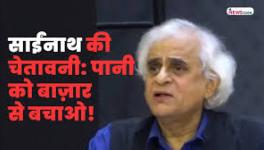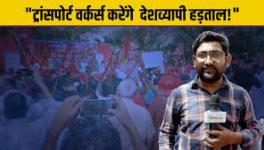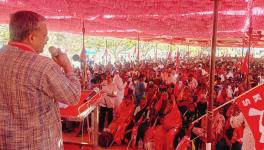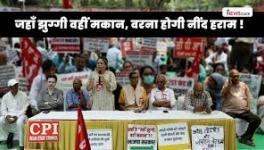Durgapur Steel Plant: Workers Unite to Thwart ‘Privatisation’ Move
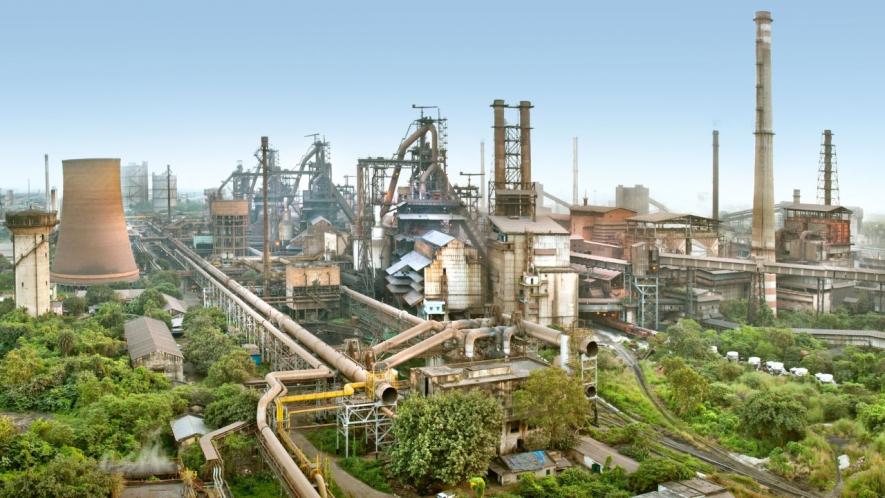
Durgapur steel plant
Durgapur Steel Plant (DSP) and Alloy Steel Plant (ASP), both under the control of the Steel Authority of India Limited (SAIL), have a long-standing tradition of excellence in the public sector of our country. To sustain it at any cost and ensure job opportunities for future generations in these sectors, Durgapur has emerged as a beacon of the united working-class movement in India.
Efforts are being made to modernise the steel industry, combat corruption, settle workers' dues, increase the wages of contract workers, ensure their respect and safety in the workplace, and there is a largely united movement in DSP and ASP in the steel city of Durgapur, Bengal.
The Centre of Indian Trade Unions (CITU) is at the forefront of this movement, playing a leading role because it is the only recognised trade union elected by the majority of DSP workers (vote for reorganisation).
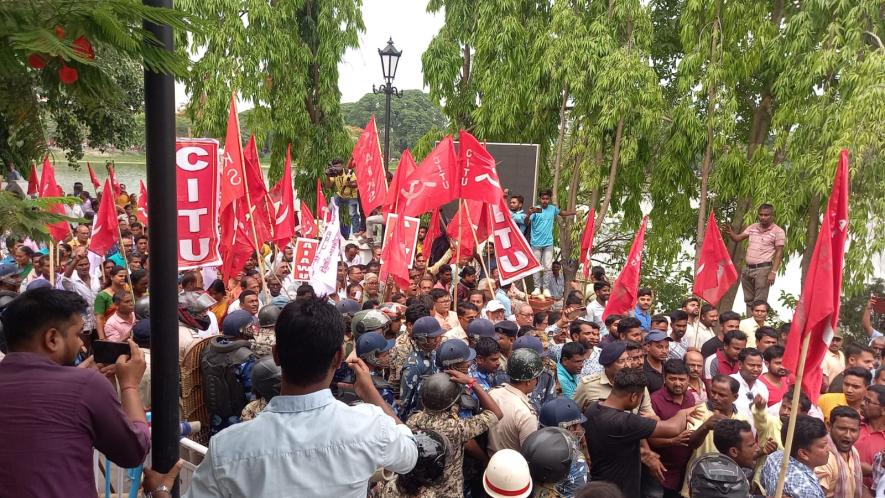
DSP Workers agitating under CITU’s banner.
A small number of workers are labouring under immense pressure and risking their lives to achieve "record production" goals to save DSP. Despite this, the authorities continue to enforce various repressive policies on workers, trade union sources allege. Workers suspect that this behaviour by DSP authorities is a step toward privatising the public sector. After the Bharatiya Janata Party-led government came to power at the Centre, this policy of repression increased rapidly, the allege.
The question is about the future of this plant, which is one of the jewels of our country. The workers have said that "We will not compromise our rights. The fight has begun, and it will continue. We want to see how much repression the SAIL-controlled DSP can bring down."
The Glorious History of Durgapur Steel Plant
In order to implement the five-year plan of our country, the Durgapur Steel Plant (DSP) was established in 1959 with collaboration from the United Kingdom. An army of talented engineers and hardworking unskilled labourers built this public sector steel industry. The plant's first blast furnace was commissioned on December 29, 1959, and production started on April 24, 1960, which is celebrated as DSP Day.
Durgapur Steel Plant is one of the five integrated steel plants of SAIL. Its initial capacity was one million tonnes of crude steel per annum. It has played a significant role in transforming Durgapur into an industrial centre and remains one of India’s largest steel plants, continuing to grow. It is situated on the banks of the Damodar River in Paschim Bardhaman, about 158 kilometers from Kolkata, the capital of West Bengal.
Durgapur, originally a small hamlet founded by a landlord named Gopinath Chattopadhyay in 1765, was initially called Gopinathpur. This landlord transformed the dense forest into a habitable area. In 1855, when the East India Company laid a railway line between Bardhaman and Andal, the area was renamed Durgapur in tribute to Gopinath Chattopadhyay’s son, Durgacharan. This marked the formalisation of the name "Durgapur," which gained significance as a railway hub. The Grand Trunk Road and the main Kolkata-Delhi railway line pass through Durgapur.
Following the establishment of DSP, several public sector industries, such as Alloy Steel Plant, Mines and Allied Machinery Corporation (MAMC), Hindustan Fertilizer Corporation (HFC), Jessop & Co. Limited, Burn Standard, and Bharat Ophthalmic Glass Limited (BOGL), were created in Durgapur under the initiative of the Union government in the late 1960s.
Simultaneously, the state government established Durgapur Projects Limited (DPL) and Durgapur Chemicals Limited (DCL). During that time, industrial workers made up the majority of Durgapur's population. The prosperous economic conditions in Durgapur had a positive effect on the undivided Bardhaman, Bankura, Purulia, and Birbhum districts.
Durgapur was also a primary source of livelihood for poor and marginalised people, including farmers and construction workers. Currently, DSP and Alloy Steel survive, Jessop is in critical condition, and the rest of the public sector industries were shut down during the Atal Bihari Vajpayee-led National Democratic Alliance government.
Additionally, the West Bengal government-controlled DPL and DCL are not in good condition. In this turbulent situation, the workers of DSP and Alloy Steel are striving to keep the two public sectors alive through a tough and exemplary movement.
When the steel plants were built, and production continued until 1972, each plant had its own management committee overseeing everything, including its mines and research development wings. However, on January 24, 1973, all these were brought under an umbrella organisation, the Steel Authority of India Limited (SAIL), with an authorised capital of Rs 2,000 crore, which was made responsible for managing the steel plants.
“In the 60s and 70s, as many as 35,000 permanent workers were employed, and temporary workers became permanent after a few days. At that time, production was 1 million tonnes per year. At present, DSP has 6,600 permanent workers and 5,500 temporary workers. These workers produce 2.4 million tonnes of steel annually under immense stress and life-threatening conditions," Biswarup Bandopadhyay, president of CITU-affiliated Hindustan Steel Employees Union in Durgapur, told this reporter.
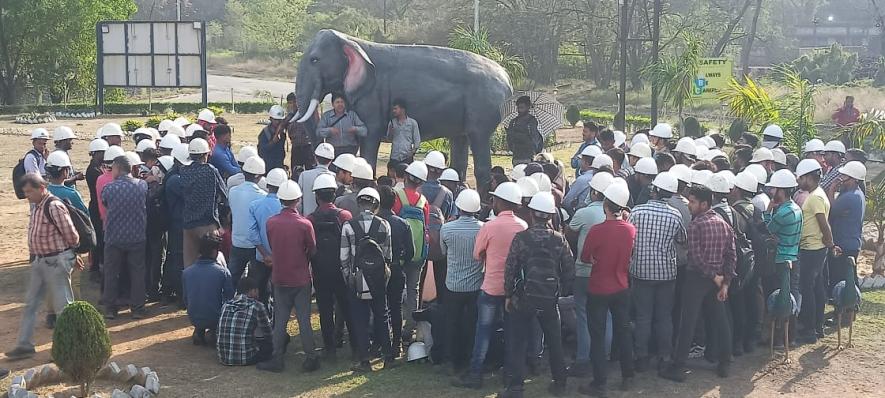
Agitation organised in DSP by Hindusthan steel plant Employees Union Durgapur.
He reiterated that five decades ago, the five steel plants—Durgapur Steel Plant, Bhilai Steel Plant, Rourkela Steel Plant, Bokaro Steel Plant, and Indian Iron and Steel Company (IISCO)—and three special steel plants—Alloy Steel Plant Durgapur, Bhadravati Steel Plant, and Salem Steel Plant—under SAIL employed 1,80,000 workers. Now, the number of workers has decreased to 57,000. Despite this, SAIL is producing record amounts of steel and ranks fifth in profitability among 236 public sector enterprises in our country, with an annual income of Rs 1 lakh crore.
In addition to competing with private steel companies within the country, SAIL has to compete with foreign companies like POSCO, ArcelorMittal, and Baosteel to survive, as SAIL does not receive any financial assistance from the Union Ministry of Steel. Instead, SAIL contributes a part of its dividend and tax to the government. In addition, SAIL contributed a significant amount of money for the statue of Sardar Vallabhbhai Patel, known as the Statue of Unity, installed in Narmada district of Gujarat at a cost of 2,989 crore.
Each unit of SAIL has a few unique productions, enabling this public sector entity to survive in a highly competitive market. For example, railway wheels are manufactured at DSP, while railway lines and rails are produced at the Bhilai plant. The Bokaro Steel Plant specialises in hot and cold rolled coils, hot rolled plates, and sheets. The Rourkela Steel Plant produces silicon steel for the power sector and high-quality pipes for the oil and gas sector. Durgapur Alloy Steel manufactures several items for national defence, including Bofors cannon shells, submarine shells, bulletproof jacket sheets, and essential components for the God Particle project.
DSP plays a crucial role within the steel industry by contributing significantly to the production of various steel products. However, questions about its “realistic modernisation” are being raised by workers, who feel victimised by the current working conditions. They say they are under immense pressure due to the reduced workforce, and question whether DSP is being modernised effectively.
Modernisation Efforts and Challenges
“In 1987-88, SAIL allocated Rs 70,000 crore for the modernisation of steel plants. DSP received only Rs 2,000 crore, and Alloy Steel did not receive any funds. The last significant modernisation work at DSP was done in 1992, and nothing has happened since then,” Bandopadhyay said.
The CITU leader said workers have to work in extreme conditions, with temperatures soaring new heights. The authorities are tactfully pushing for daily production records to be broken, putting constant pressure on the workers, he said, adding that this had led to a lack of safety in the plant, resulting in an average of 10 worker fatalities at DSP and 25 fatalities across all SAIL units annually due to safety issues. Many permanent and temporary workers have fallen ill.
Safety Concerns
There have been several tragic accidents at DSP, including the deaths of workers such as Bidyut Chakrobarty, Swapan Mandal, Nabo Kundu, Ashoke Choudhury, and Sanjoy Chakrobarty, among others, he said. Despite it being mandatory to offer jobs to the legal heirs of deceased workers, none of their families have been employed yet.
Temporary workers, such as Sarbhashit Dhangar and Binoy Kumar Harijan also lost their lives in accidents, and their families have not received compensation, he said. Families of the deceased workers have been complaining about the lack of attention from DSP authorities regarding compensation.
Former Member of Parliament Bangsogopal Choudhury had even written a letter to the Union Steel Minister on February 29, demanding full safety measures in the light of the accidents at DSP. The Hindusthan Steel Employees Union had also expressed concern about the matter several times, but no action has been taken by DSP authorities. Safety flaws remain a constant issue, the workers said.
Corruption Issues
In addition, incidents of corruption have been reported at DSP. Recently, a financial corruption case came to light involving two executives who have been suspended for allegedly embezzling Rs 3.3 crore. It was reported that workers' provident fund money was allegedly transferred to the accounts of the executives' wives. Also, there are allegations of corruption in the renovation of quarters and the beautification of the plant. Out of 19,141 living quarters for DSP workers in Durgapur, 626 have roofs that leak, said workers.
DSP used to run eight hospitals in Durgapur; now, only four are operational, forcing many workers to seek treatment at private hospitals. The number of schools run by DSP has also decreased from 15 to four. Workers claimed they were being neglected in terms of welfare benefits.
Issues with Contract Workers
Currently, 5,500 contract workers are employed daily at DSP, but 25,000 people are registered for contract work and are rotated frequently. A significant corruption syndicate has been formed around this process, alleged trade union leaders. Contract workers earn Rs 14,000-15,000 a month, but they are forced to pay Rs 2,000 to the syndicate leaders, who are allegedly affiliated with the ruling party of Bengal, Trinamool Congress. These workers are often required to engage in various activities, including hooliganism during elections, at the behest of the ruling party. Workers alleged that this syndicate extort Rs 11 crore =annually through this illegal arrangement.
It has also been reported that 3,556 contract workers who were members of the CITU-affiliated Hindusthan Steel Employees Union, Durgapur, have been deprived of their jobs for refusing to pay extortion money to the syndicate. DSP authorities are silent despite knowing everything, the workers allege.
United Trade Union Movement in Durgapur
The salary agreement for DSP workers is supposed to be renegotiated every five years. The last such agreement was in 2017. However, negotiations have been stalled for two years, despite repeated reminders to DSP authorities, who remain silent. Night shift allowances, house rent, and monthly incentives have not been reviewed since 2007.
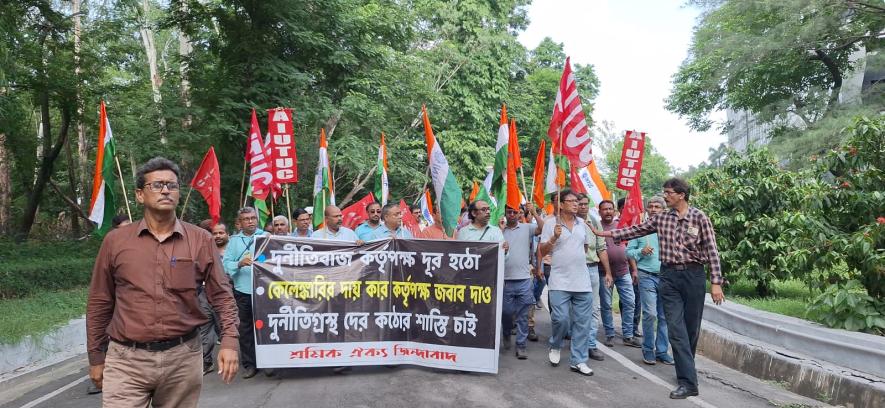
United trade union movement in Durgapur steel plant to save the public sector.
All Central trade unions said they were united in their fight to resolve these issues. In response, DSP authorities are employing various suppression tactics to break this united movement. Circulars threatening action against the movement have been issued, and several trade union workers and leaders have received charge sheets for their agitation activities, according to Bandopadhyay.
He also said that DSP was planning to introduce Biometric Radio Frequency Identity (RFID) cards for worker surveillance. It will be mandatory for all workers to carry these RFID cards, which will track their location and movements. Many workers view this as a serious infringement on their personal freedom and are concerned about who will monitor the system. There is a fear that employees' data will end up in the hands of private companies, as reliable sources indicate that the RFID system will be managed by a private entity.
In this context, BJP-affiliated Bharatiya Mazdoor Sangh's DSP leader Manas Chatterjee and Indian National Trinamool Trade Union Congress DSP's General Secretary Shehes Ghosh both said the workers are striving to save DSP, and questioned why the authorities were introducing repressive policies instead of settling workers' dues. All trade unions said they would continue their united fight against these policies, leveraging their respective organisational strength.
According to DSP workers, production should be increased to 10 million tonnes per annum through realistic modernisation, recruitment of sufficient trained permanent workers. DSP is in place to expand this production. In spite of the extra risks that the workers are taking to increase production, if DSP is unable to reach the target, the future of DSP and its workers looks grim.
Anjani Saren, DSP Chief General Manager (Personnel and Administration) told this writer that there was a need for collective efforts to keep DSP operational, as it was a vital source of livelihood. He said there was no reason for panic regarding the RFID system, stating that it would be monitored by DSP itself.
However, Bandopadhyay expressed concern over DSP's future, noting that the number of trained and experienced workers was decreasing annually due to retirements, with no new recruits being hired.
The work is being carried out by trainees who are not being made permanent. According to the new reforms of labour laws, trainees will continue without becoming permanent employees, and cannot demand permanent status. Do the DSP authorities want to implement the new labour law reforms? As Bandopadhyay, adding that given the suppression of the workers' movement and the maintenance of this system, “DSP will be handed over to a private organisation in the near future.”
No response has been received from DSP authorities regarding this apprehension, he added.
The writer covers the Jangal Mahal region for ‘Ganashakti’ newspaper in West Bengal.
(All pictures taken by Madhu Sudan Chatterjee)
Get the latest reports & analysis with people's perspective on Protests, movements & deep analytical videos, discussions of the current affairs in your Telegram app. Subscribe to NewsClick's Telegram channel & get Real-Time updates on stories, as they get published on our website.










